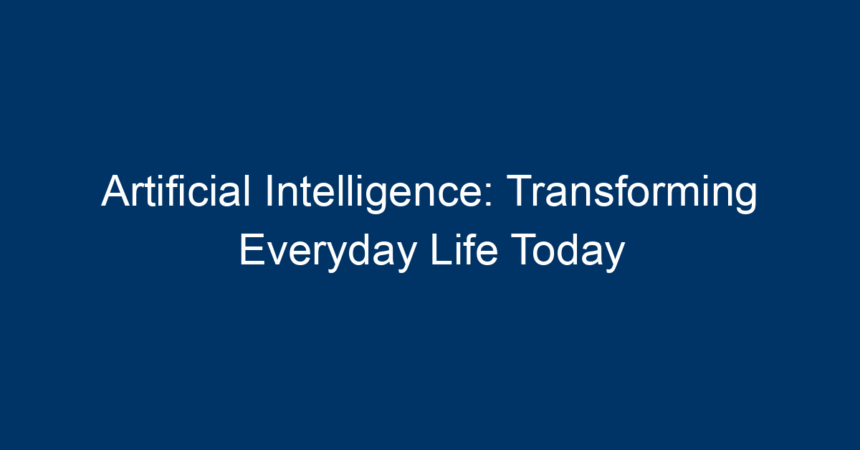Introduction
In the past decade, artificial intelligence (AI) has shifted from a futuristic concept to an integral part of our daily lives. From streamlining tasks in workplaces to enhancing personal convenience at home, AI technologies are revolutionizing how we interact with the world. This article delves into the manifold ways artificial intelligence is reshaping various aspects of our everyday life today, examining its impact, benefits, and challenges.
The Rise of Artificial Intelligence
Artificial intelligence refers to simulations of human intelligence, allowing machines to perform tasks that ordinarily require human cognitive functions. These include learning, reasoning, problem-solving, and even understanding natural language. The surge in AI’s popularity is fueled by vast amounts of data, increased computational power, and advancements in machine learning technologies.
The Importance of Data
Data is the lifeblood of artificial intelligence. Businesses harness big data to generate insights and facilitate decisions. AI systems analyze vast datasets to uncover trends, predict outcomes, and provide personalized experiences for users. For instance, platforms like Netflix and Spotify utilize AI algorithms to recommend films and music tailored to individual preferences.
Artificial Intelligence in Everyday Life
Smart Homes: Convenience at Your Fingertips
One of the most visible applications of AI is in smart home technology. Devices like Google Home and Amazon Echo leverage AI to automate and enhance daily tasks.
-
Voice Assistants: AI-driven voice assistants simplify our lives by enabling hands-free operation. You can ask your voice assistant to set reminders, play your favorite songs, adjust thermostat settings, or even control lights, illustrating how AI enhances everyday tasks.
- Home Security: AI enhances home security as well. Intelligent cameras and alarm systems can recognize faces, detect unusual activity, and alert homeowners, thus providing peace of mind in an increasingly unpredictable world.
AI in Healthcare: A New Era of Medicine
Artificial intelligence is significantly impacting the healthcare sector, transforming how we diagnose, treat, and manage health conditions.
-
Diagnostics: AI algorithms help in analyzing medical images or genomic data to detect diseases at an early stage. For example, AI-powered tools like IBM Watson can analyze a patient’s medical records and suggest possible diagnoses faster than a human could.
- Predictive Analytics: By forecasting disease outbreaks or understanding patient trends, AI can drive more effective public health responses. With the rise of telehealth, AI tools facilitate remote diagnostics, allowing doctors to assist patients more efficiently.
Transportation: A Safer, More Efficient Journey
The transportation industry is undergoing a transformation, with AI playing a pivotal role.
-
Autonomous Vehicles: Companies like Tesla and Waymo are pioneering self-driving technology with AI-driven systems. These vehicles can navigate roads, avoid obstacles, and even learn from their environment, potentially reducing accidents and improving traffic flow.
- Traffic Management: AI applications are revolutionizing traffic management by analyzing real-time data to optimize traffic signals and reduce congestion. This not only saves time but also decreases environmental impact.
Retail and E-commerce: A Personalized Experience
The retail industry has witnessed a fundamental change due to artificial intelligence.
-
Customer Insights: AI tools analyze customer behavior and preferences, enabling businesses to offer tailored recommendations. These insights enhance customer satisfaction and drive sales.
- Inventory Management: AI streamlines inventory management through predictive analytics, ensuring that businesses maintain optimal stock levels to meet consumer demand without excess waste.
The Challenges and Ethical Considerations of AI
Despite its many benefits, the rise of artificial intelligence poses several challenges and ethical dilemmas that must be addressed.
Data Privacy Concerns
As AI systems rely heavily on data, concerns surrounding privacy are paramount. Personal data can be misused or compromised, leading to potential breaches of confidentiality. It is crucial for businesses to establish ethical practices that prioritize user privacy while utilizing AI technologies.
Job Displacement
The integration of AI into various industries raises concerns about job displacement. While AI enhances efficiency and productivity, it can also lead to the automation of certain roles, resulting in a changing job landscape. It is essential for businesses and governments to invest in retraining programs to help displaced workers transition into new roles.
Bias in AI
Another pressing issue is bias in artificial intelligence systems. AI algorithms can inadvertently perpetuate existing biases present in the training data, leading to unfair and discriminatory outcomes. Efforts must be made to ensure fairness and inclusivity in AI algorithms.
The Future of Artificial Intelligence
As we look to the future, the role of artificial intelligence will only continue to grow. Innovations in AI are on the horizon, poised to transform sectors such as education, agriculture, and environmental monitoring.
Education and AI
In the education sector, AI could revolutionize personalized learning experiences. Adaptive learning platforms can tailor educational content to meet individual student needs, fostering engagement and improving outcomes.
Sustainable Agriculture
AI technologies are also being leveraged in agriculture to optimize crop yields and monitor environmental conditions. By analyzing data from IoT devices, farmers can make informed decisions that enhance sustainability and efficiency.
Actionable Insights for Embracing AI
-
Stay Informed: Keep up with the latest advancements in AI technology to understand how they might affect your life and industry.
-
Leverage AI Tools: Explore AI-driven tools and applications that can enhance your productivity, whether at work or home.
-
Prioritize Ethical Considerations: Advocate for responsible AI usage and promote practices that safeguard user privacy and prevent bias.
-
Invest in Continuous Learning: Upskill and stay adaptable to navigate the changing job landscape influenced by AI automation.
- Support Research and Development: Encourage businesses and policymakers to invest in AI research and development, focusing on innovations that prioritize social good.
Conclusion
Artificial intelligence is not just a buzzword; it’s a transformative force reshaping our everyday lives. From enhancing convenience at home to revolutionizing healthcare and transforming businesses, AI’s impact is profound and far-reaching. While challenges such as data privacy and job displacement must be addressed, the continued evolution of AI promises a future filled with opportunities. By embracing artificial intelligence today, we can work towards a smarter, more efficient, and more equitable world for tomorrow.




